

Germany Federal Election
23 February 2025
SEERIST EVENT REPORT�
SCroll down to explore
Germany Federal Election 2025�
A federal election for the lower house of Germany’s Bundestag (Parliament) will be held on 23 February 2025. The snap-elections were called for after the collapse of the coalition government in November 2024.
�
As the Federal election approaches, Seerist closely monitors related events, providing timely analysis and forecasts to inform users of the latest developments.�
Source: Seerist and Control Risks�
EVENT

PulseAI identifies micro-changes in stability and looks for anomalies to alert users to actions that may pose a risk or present an opportunity to their operation. PulseAI triggered alerts notify analysts of important developments, speed the process of finding and accessing mission-relevant data, and enable analysts to maintain situational awareness. �
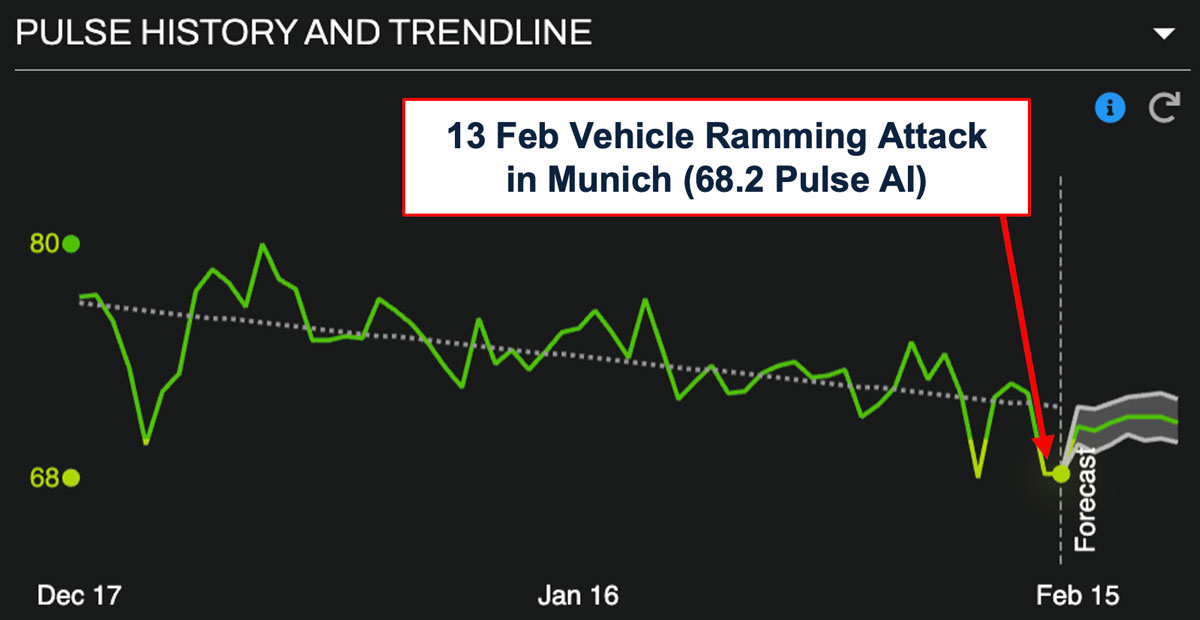
The PulseAI History and Trendline in Germany shows that over the past 60 days, stability has ranged between 70 and 79 points. While the PulseAI score declined below average following the vehicle ramming attack in Munich on 13 February, Seerist’s seven-day Pulse forecast predicts stability to remain between a score of 69 and 72.�
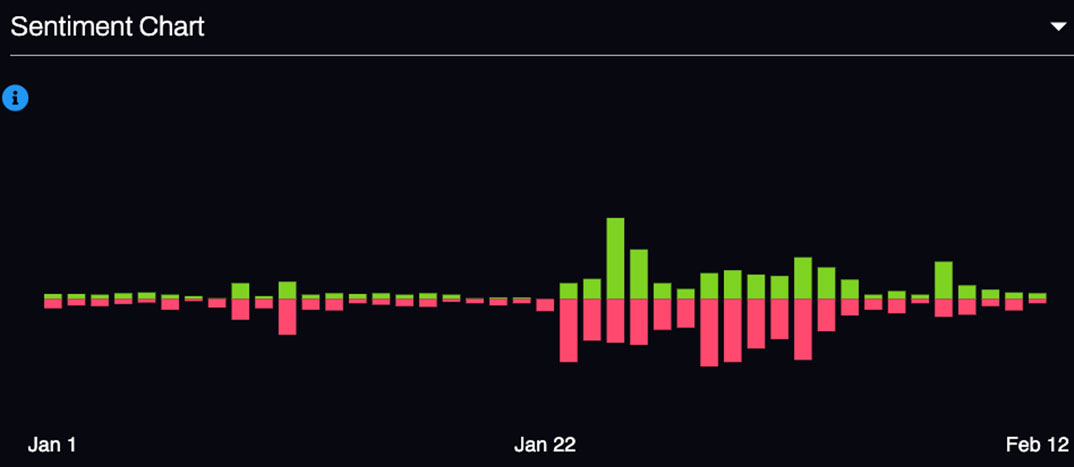
Seerist recorded a spike in negative public sentiment between 22 January and 2 February after far-right party, Alternative for Germany (AfD), called for stricter immigration policy – one of the primary election issues – following a fatal knife attack in Aschaffenburg on 22 January. Public sentiment subsequently shifted in a positive direction resulting from the rise of anti-right-wing extremism in the country. �
Seerist EventsAI Emotion uses natural language processing to identify and categorize emotions expressed in textual data. Seerist recorded an increase in Anger and Fear emotions on 2 February during major protests against the Christian Democratic Union (CDU) and AfD.�

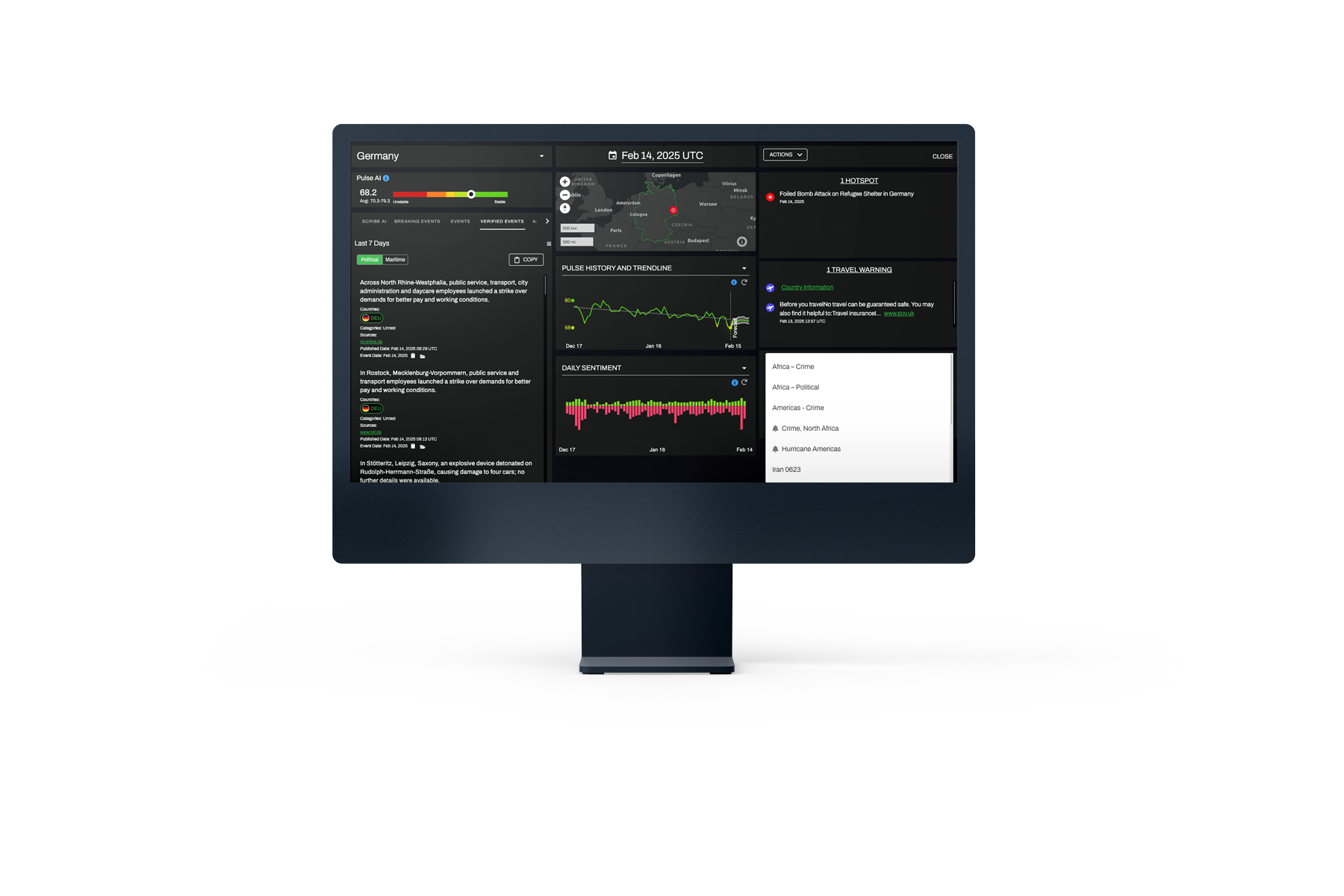
PulseAI
PulseAI History and Trendline
EventsAI Sentiment
EventsAI Emotion




EventsAI Sentiment shows public sentiment across Germany. �
Seerist Events AI shows how reports related to the federal election can indicate levels of anger or fear depending on the way the report has been portrayed.�
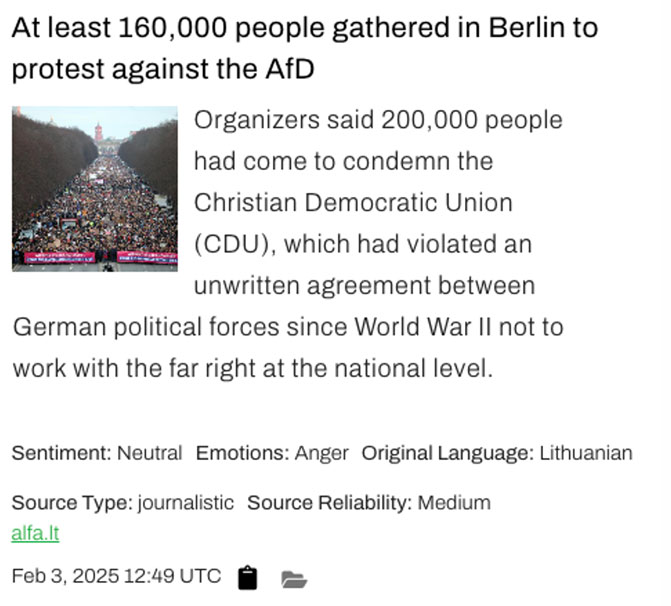
EventsAI

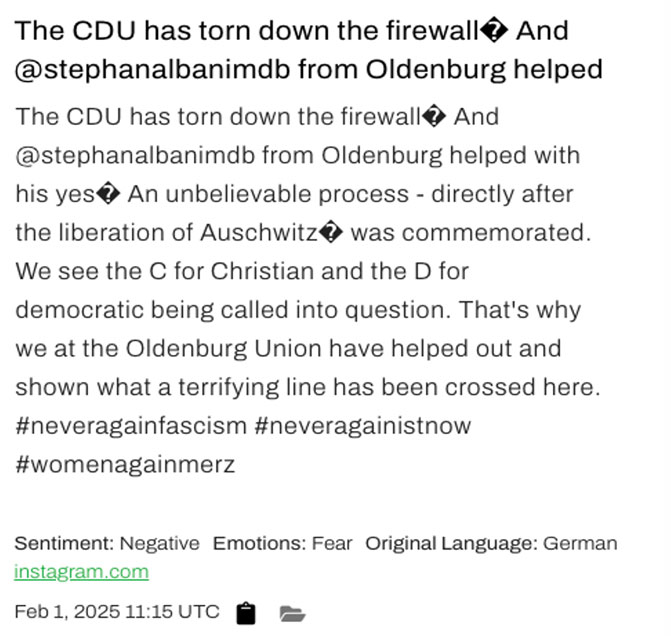
Anger
Fear
OVERVIEW
Germany Security Landscape
According to a 13 February 2025 Control Risks report, “overall, vehicle-ramming incidents in Germany remain infrequent but they appear to be an increasing occurrence, and reflect a wider trend of lone perpetrators engaging in low-sophistication attacks such as vehicle-ramming or knife attack” and “businesses and employees are unlikely to be targeted directly in similar incidents but will continue to face an incidental threat from such attacks.
Source: Seerist and Control Risks��
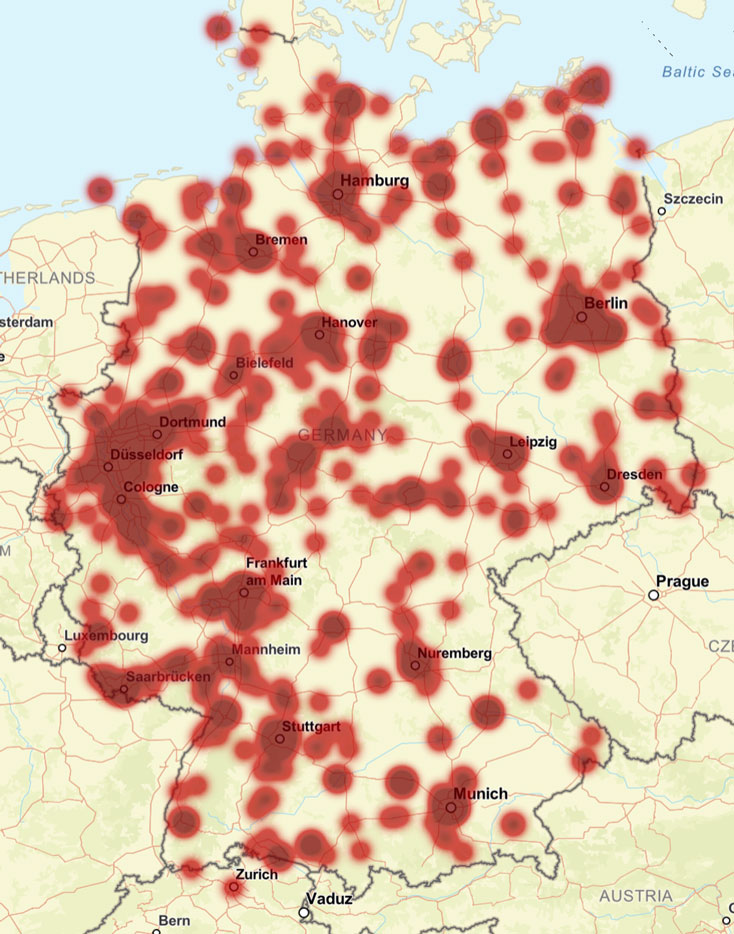
The heatmap of Verified Events, corroborated by a team of subject matter experts that identify, verify, and monitor events 24/7, shows all verified crime, unrest, and terrorism events in Germany between 1 January 2024 and 14 February 2025.�
Crime levels sit around the EU average, with hotspots in northern states and in urban areas. The likelihood of a terrorist attack has increased in recent years with greater activity from far-right and Islamist extremist groups.
Protest action occurs occasionally but is unlikely to result in anything beyond temporary disruption to personnel movement and supply routes through increased congestion or temporary road closures. Direct action – particularly by environmental activists – holds the potential to cause disruption. Security and intelligence services are very effective in combatting crime and terrorism, and in containing protest activity.
There is a low but credible likelihood of personnel perceived as being of non-European descent being targeted in hate crimes, involving either verbal or occasionally physical assault. Such crimes are more likely in more deprived areas of the country, particularly in the former east.�


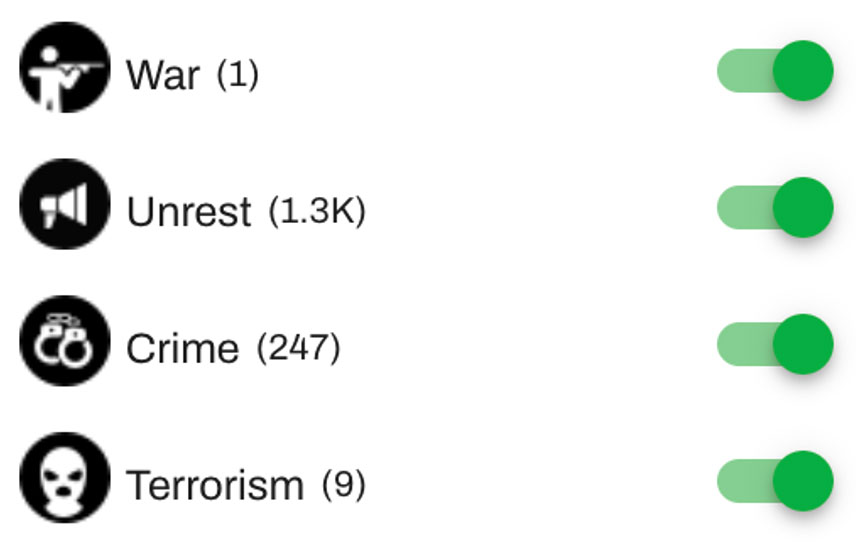
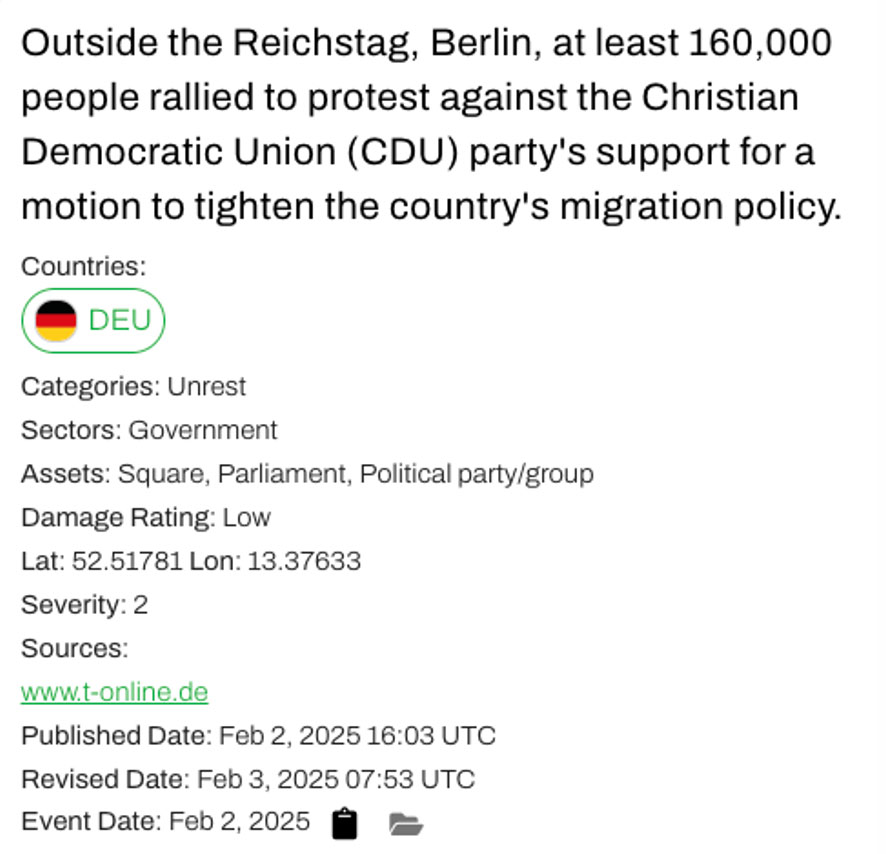
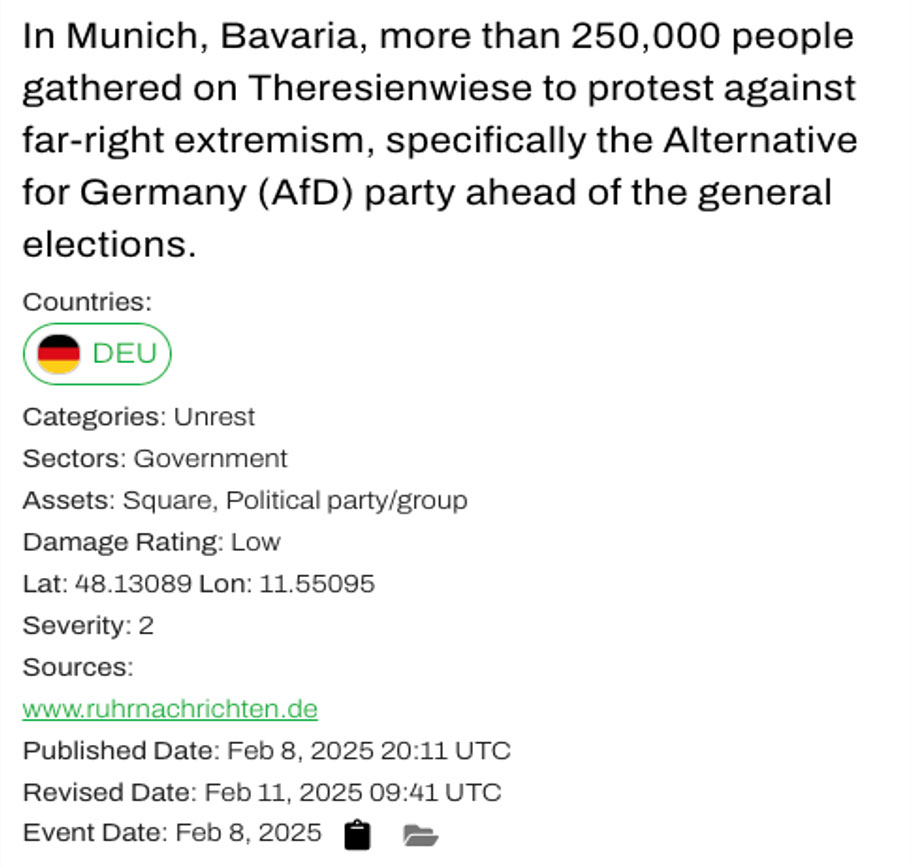
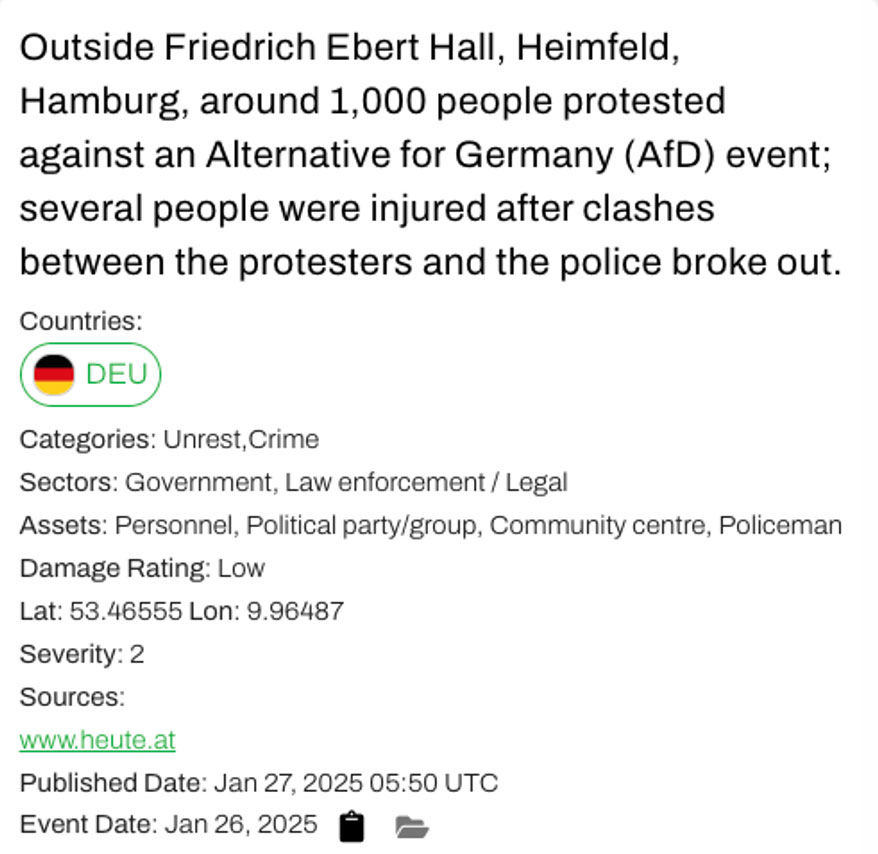

Examples of Major Verified Unrest Events
1 January 2024 –
14 February 2025�
Verified Security Event Trends
Verified unrest events accounted for most security events recorded on Seerist across Germany. Unrest events predominantly took place in the form of protests, followed by blockades and clashes between protestors and security forces. Meanwhile, local community groups accounted for the largest portion of perpetrators in unrest events, followed by labor/ trade unions and environmentalists. Verified crime events included attacks against election workers, vandalism of party offices and election posters.�
Source: Seerist and Control Risks�
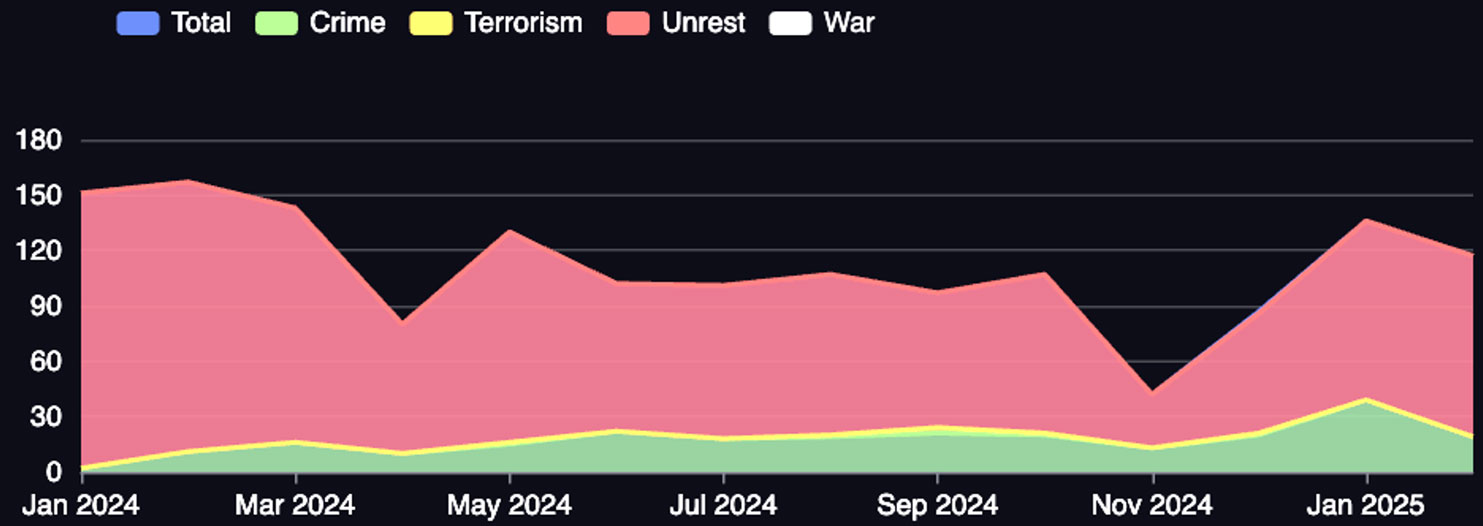
Unrest:
146 Events
Crime:
11 Events
February 2024
Unrest:
114 Events
Crime:
15 Events
Unrest:
97 Events
Crime:
39 Event
January 2025
Verified Security Event Trends Across Three Categories (2024-2025)

May 2024

Monitor Security Developments across Germany using EventsAI�
5 Examples of Search Results
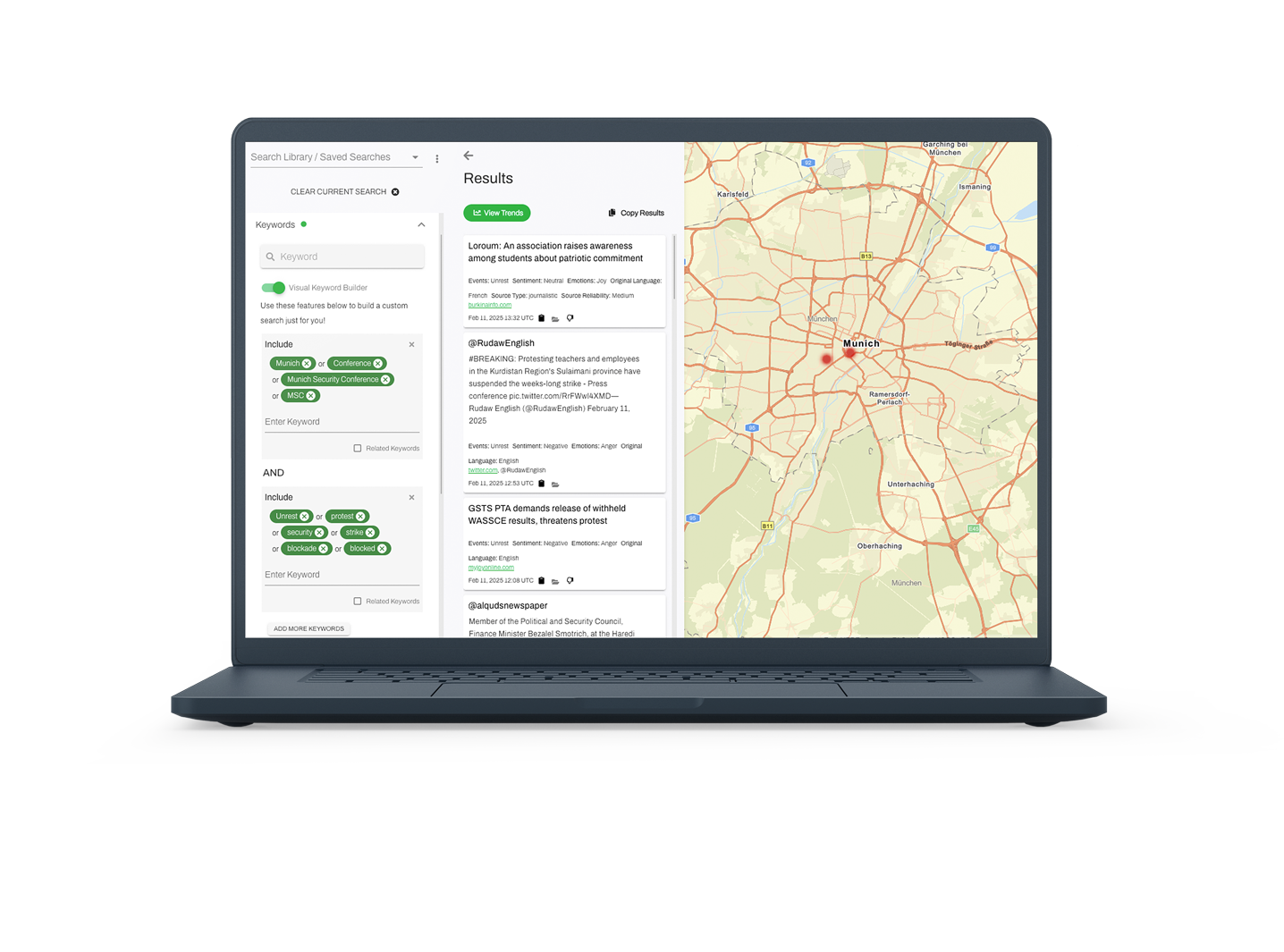

EventsAl searches can be tailored using custom keywords to find information specifically on election-related unrest and crime. This allows users to monitor both traditional news coverage of security developments and planned unrest events published by activists on social media.�
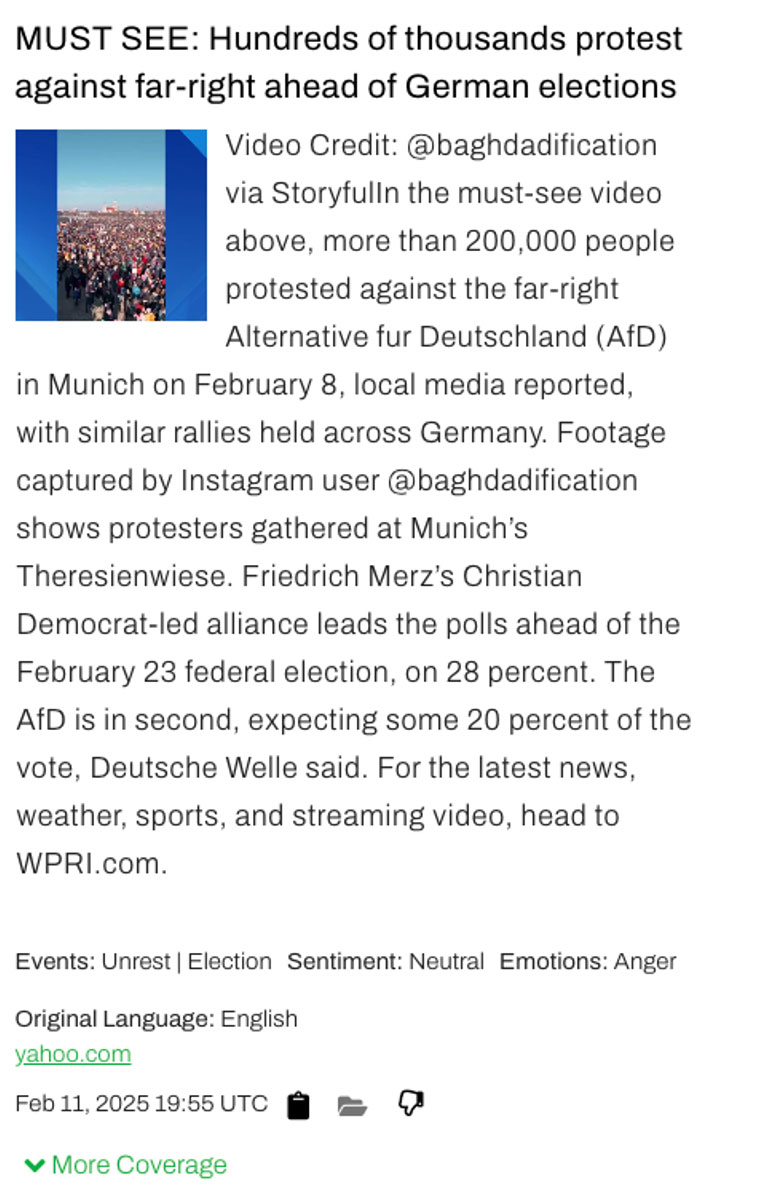
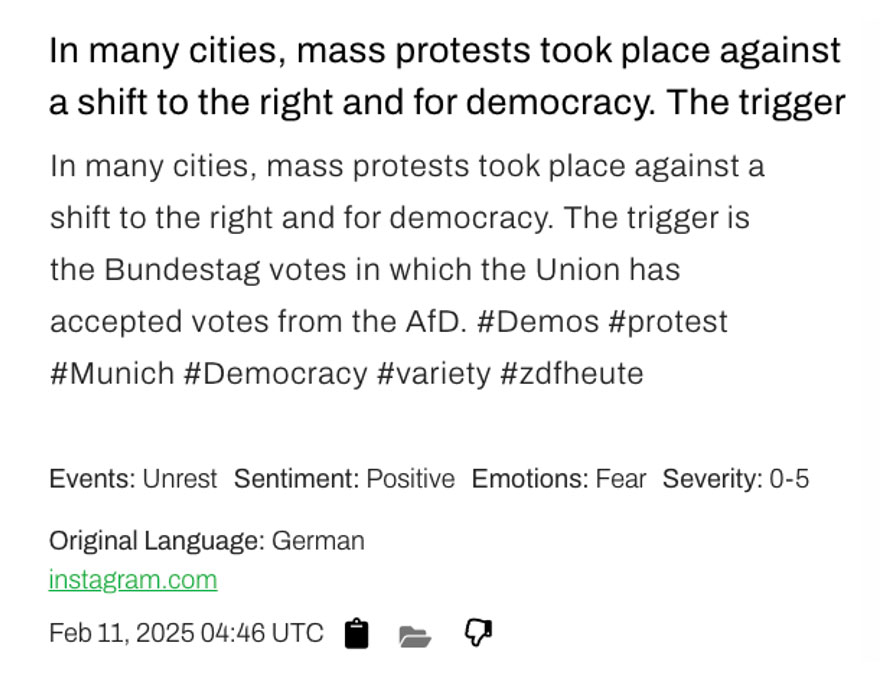
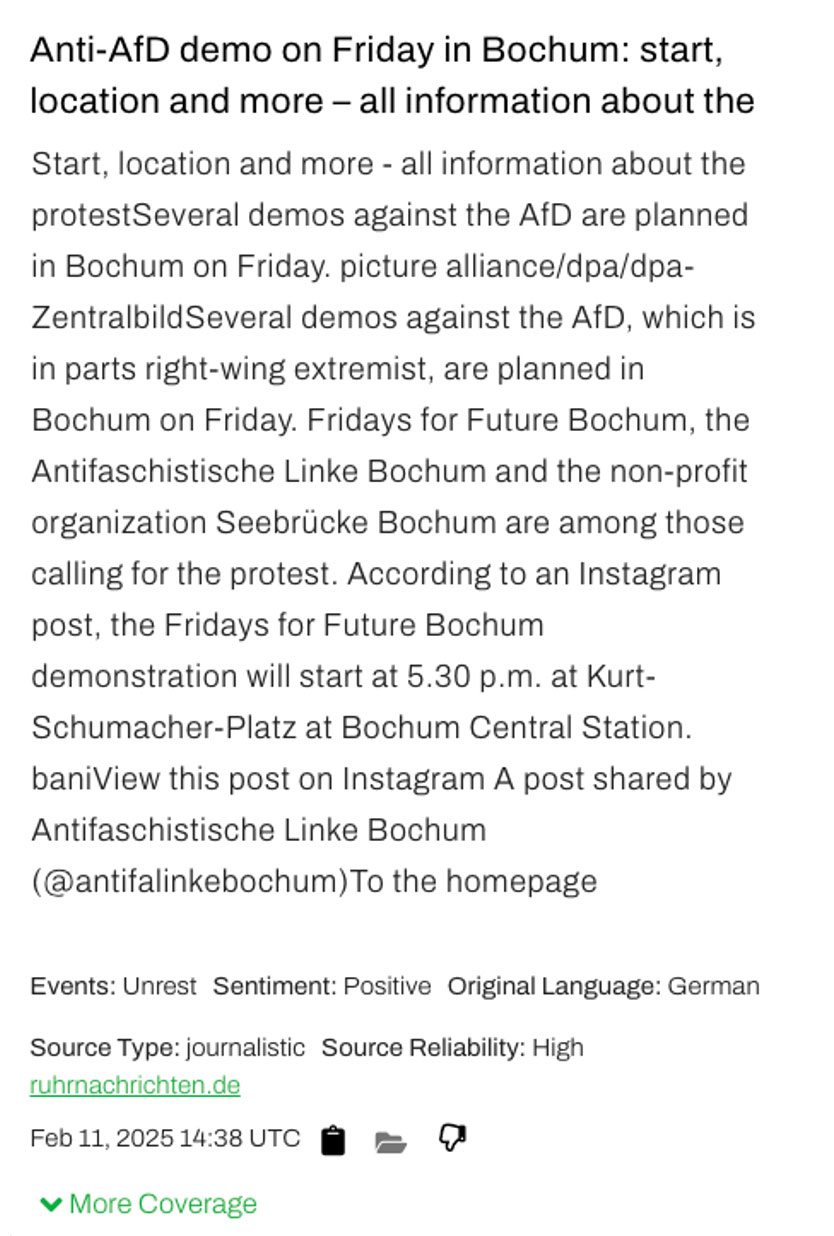
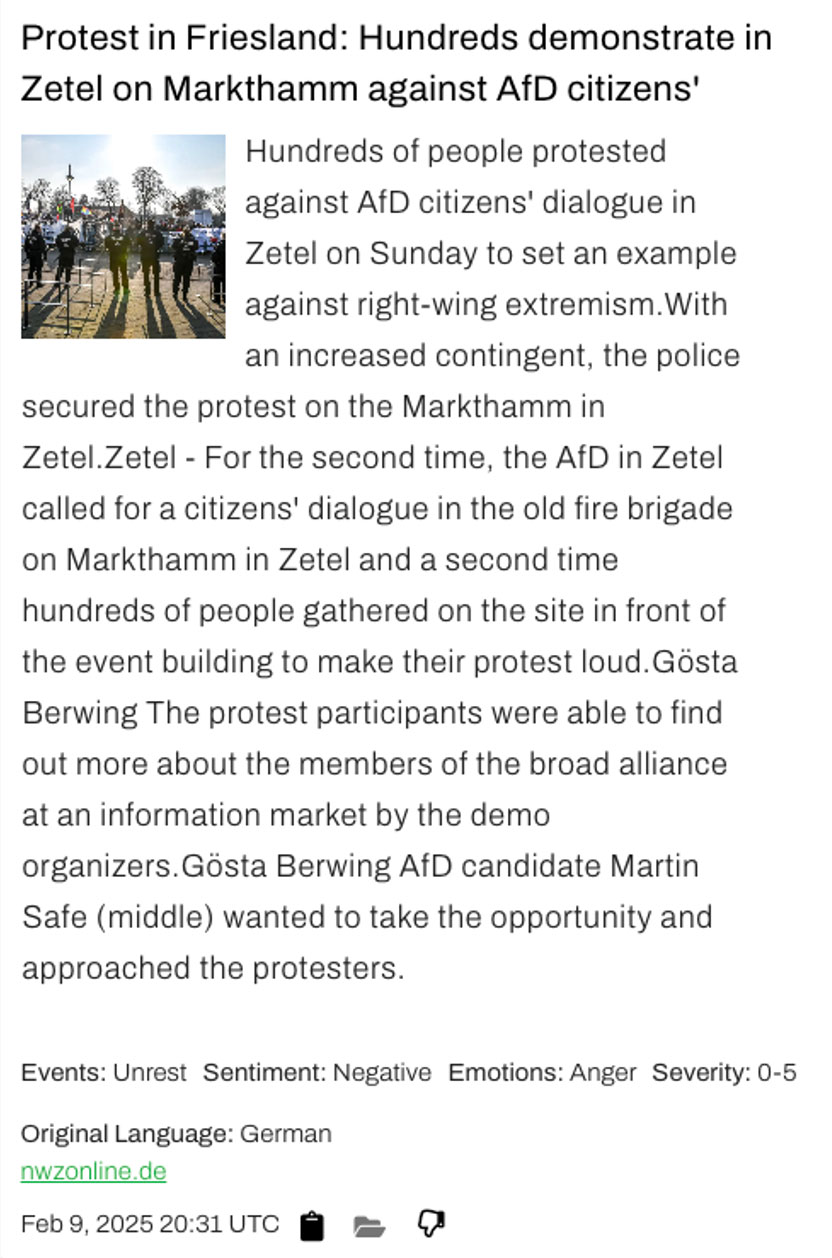
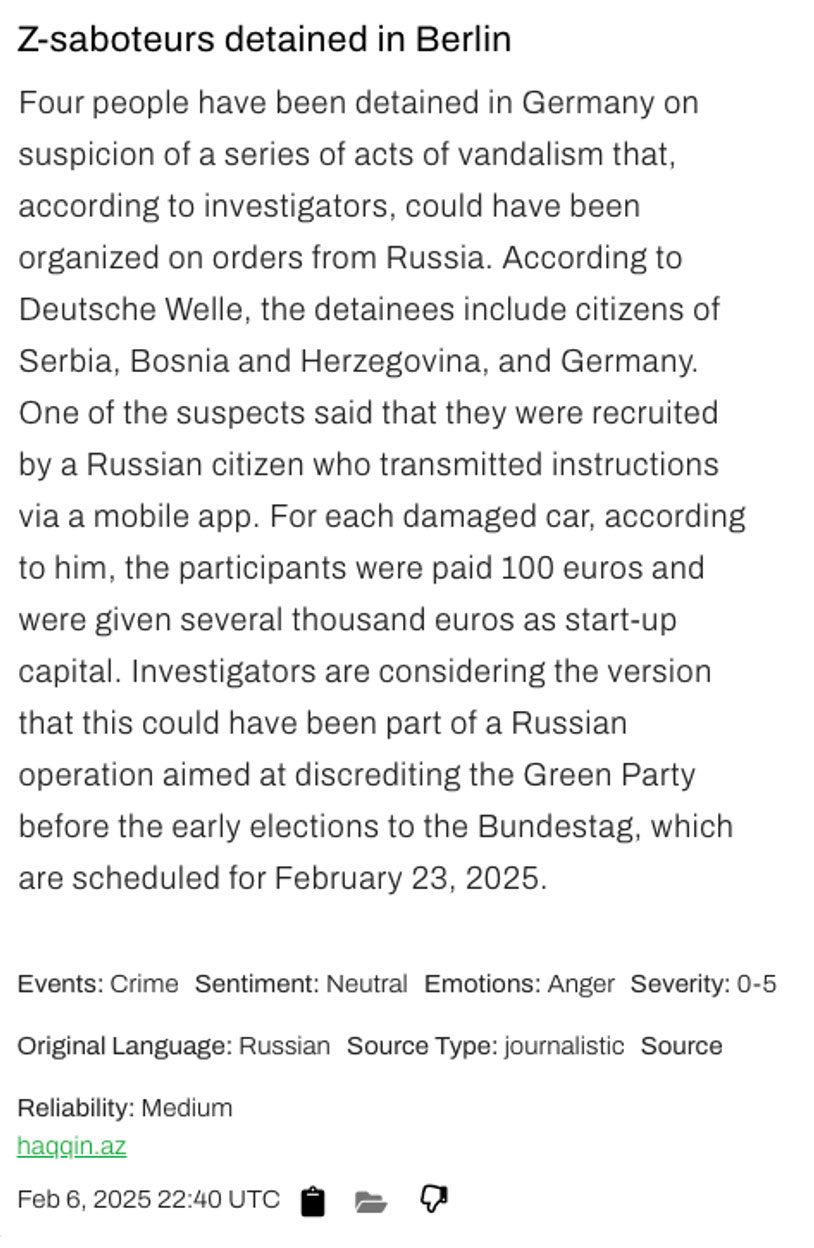
Source: Seerist
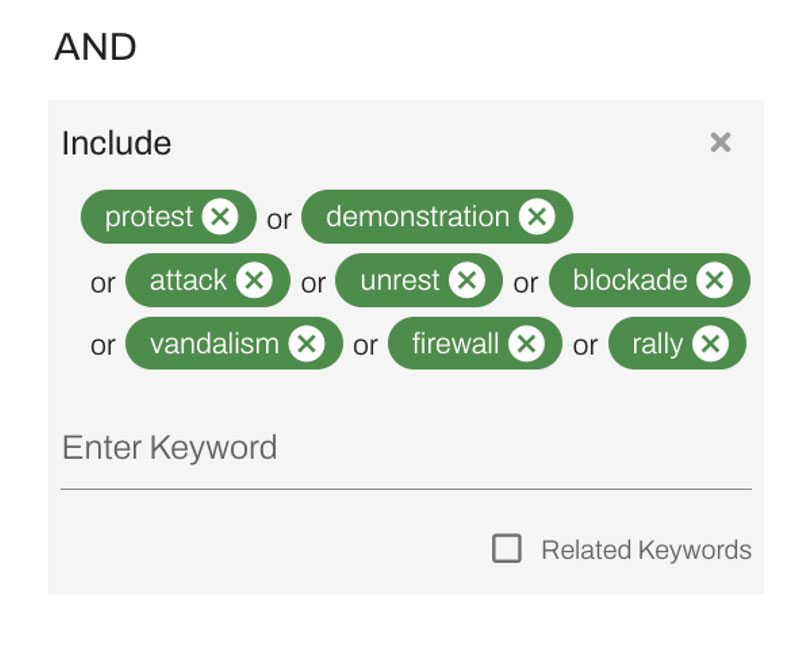
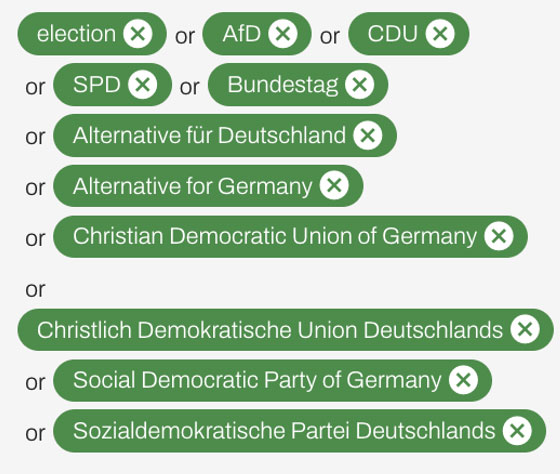
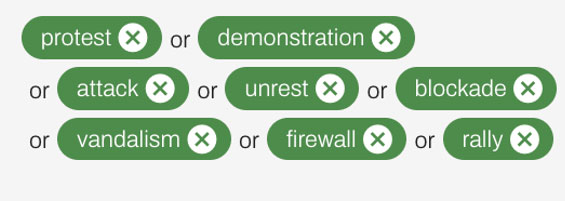
Stay Informed on High-Profile Events with DiscoverAI
Use DiscoverAI to discover emerging news events that might impact the upcoming federal election.�
Source: Seerist �
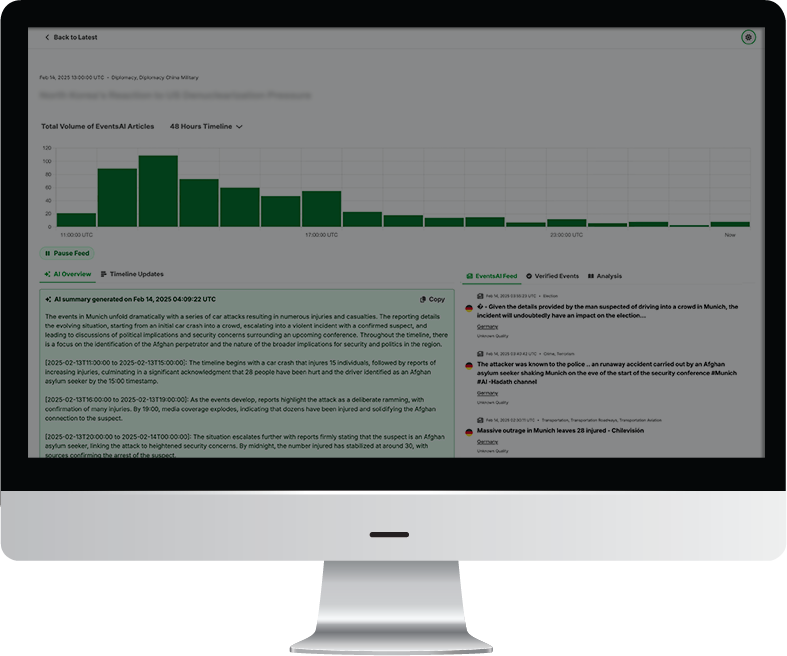

The timeline chart illustrates that the volume of related EventsAI feed over the past 48 hours gradually decreased after seven hours, with open-source reporting shifting from coverage of the vehicle ramming attack itself to linking it to the upcoming federal election.�

GenerativeAI summary delivers real-time briefs on events as they unfold. Combined with real-time feeds (image on the right) from EventsAI, Verified Events, and analysis, this enables users to quickly analyse and filter out irrelevant information, while staying ahead of the upcoming election.�
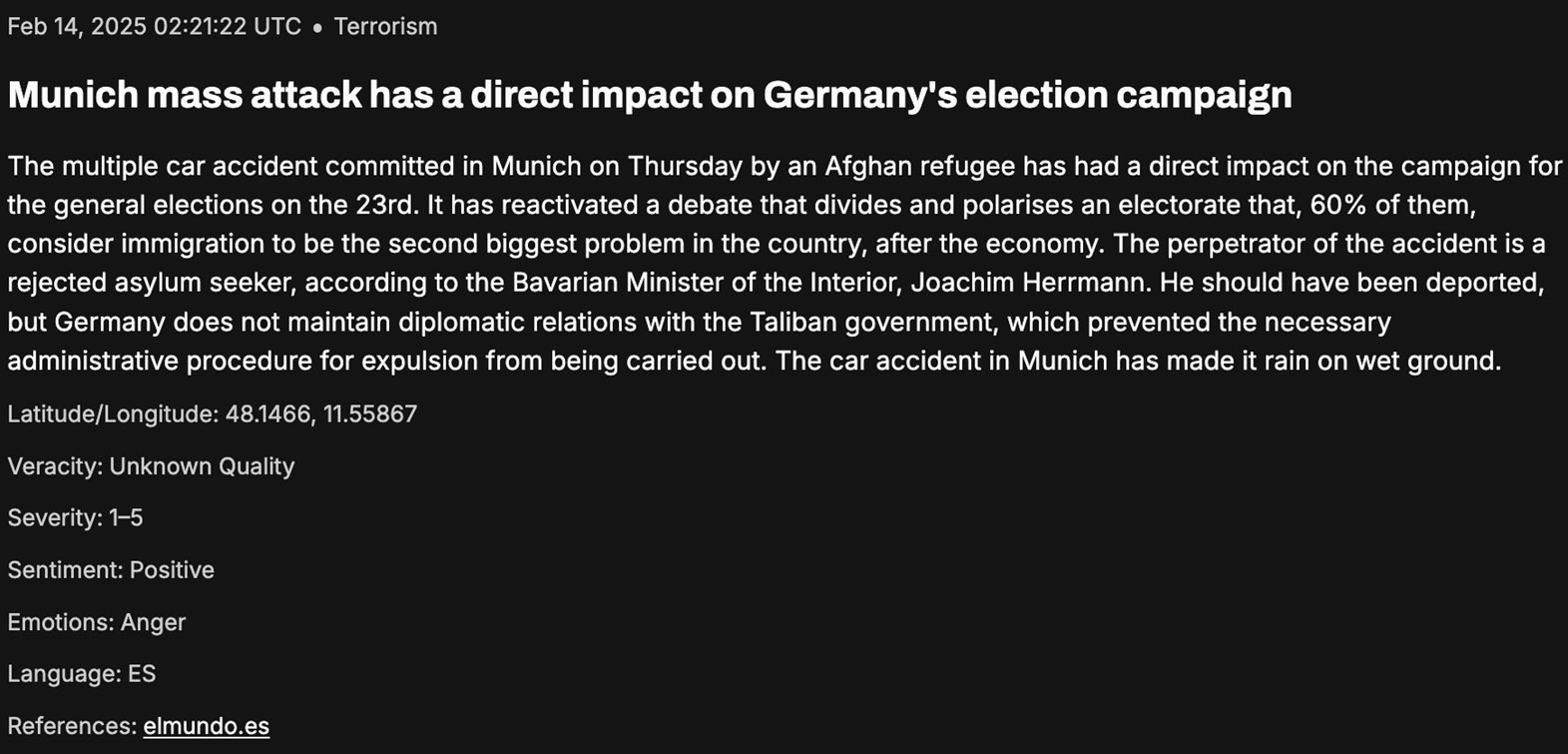
Future Events to Monitor in Germany
Future Events cover one-off or recurring events that could cause operational disruption, heightened security threats or result in significant political decisions. Found on the dedicated country page, all calendar events are given a rating for their potential severity, in addition to assessing impact types such as ‘unrest’ and ‘transportation’.�


















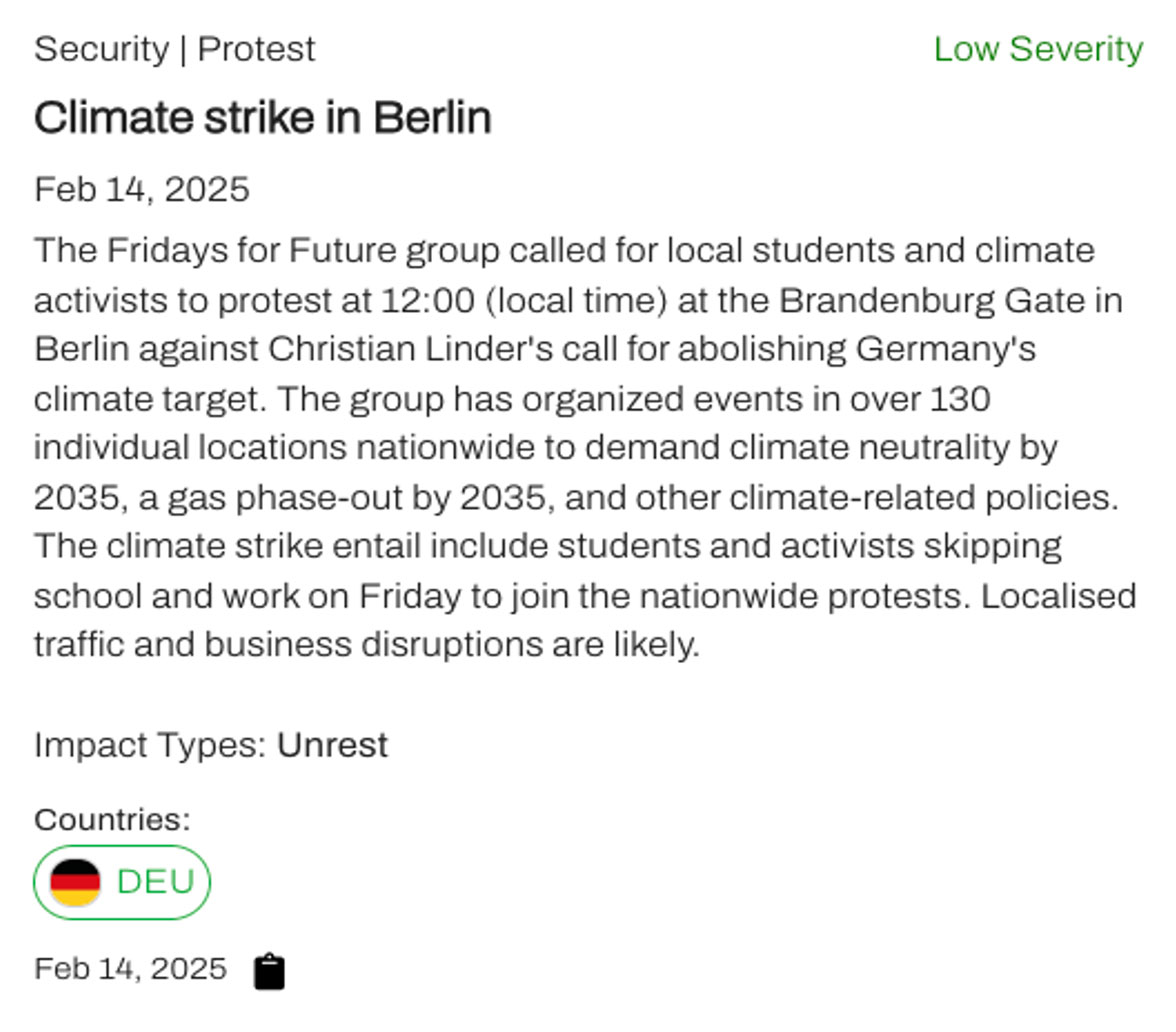
1 of 3


















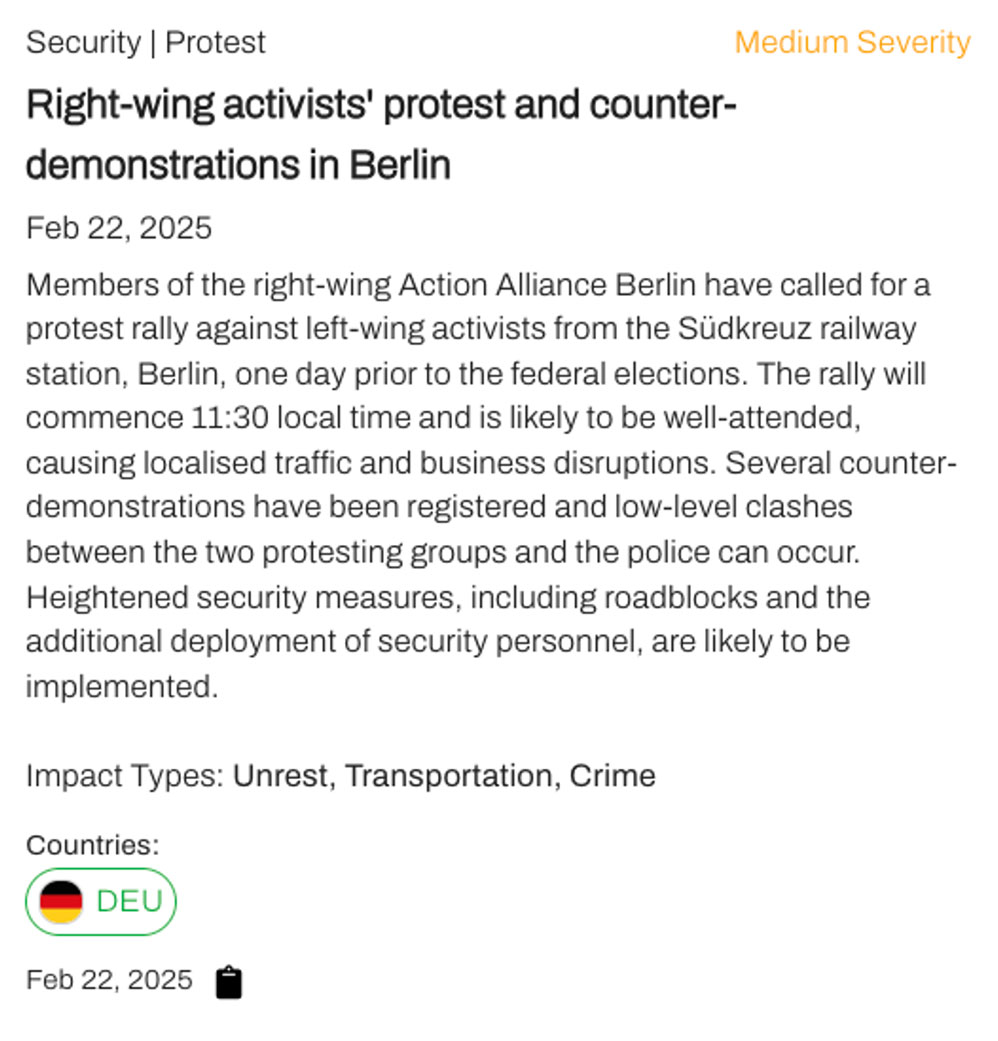
2 of 3


















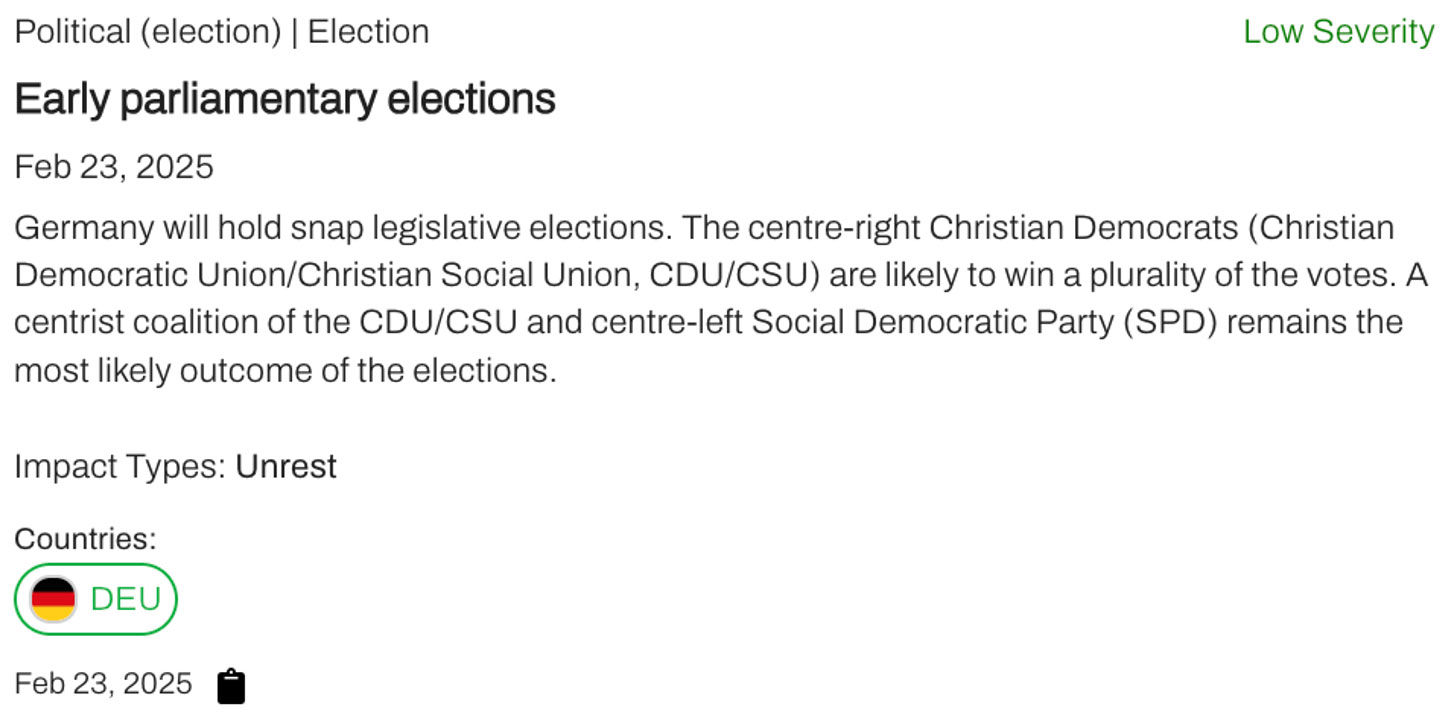
3 of 3


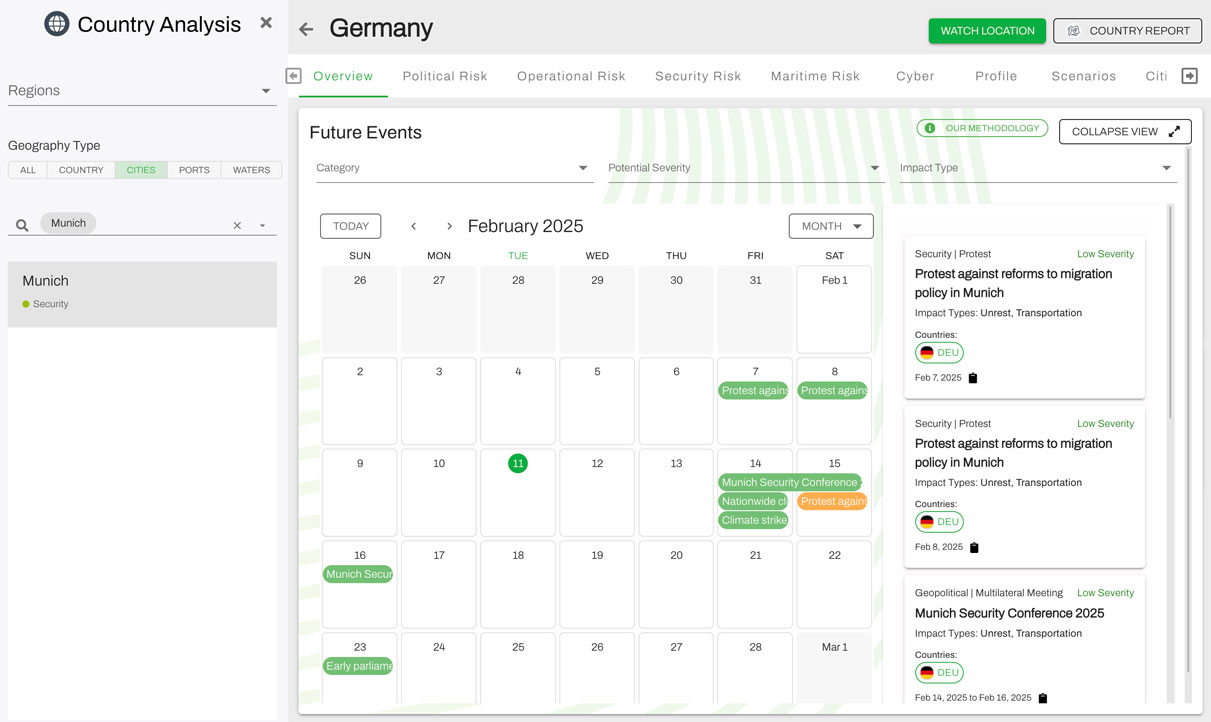
Seerist’s dedicated intelligence team reports Breaking Events as soon as they are detected – even if the information initially does not meet our standards for verification. As details around a Breaking Event emerge, we will issue new alerts and indicate when an event has been Verified (one or more Verified Events will be added) or Confirmed (for events that do not fall under our methodology).
Breaking Events are triggered by events or activities in a specific location that both have:
Potential to be high-impact incidents that could affect immediate physical or operational security
Diverge from the baseline security, operational or political environment in that location, and that we assess to be anomalous.�
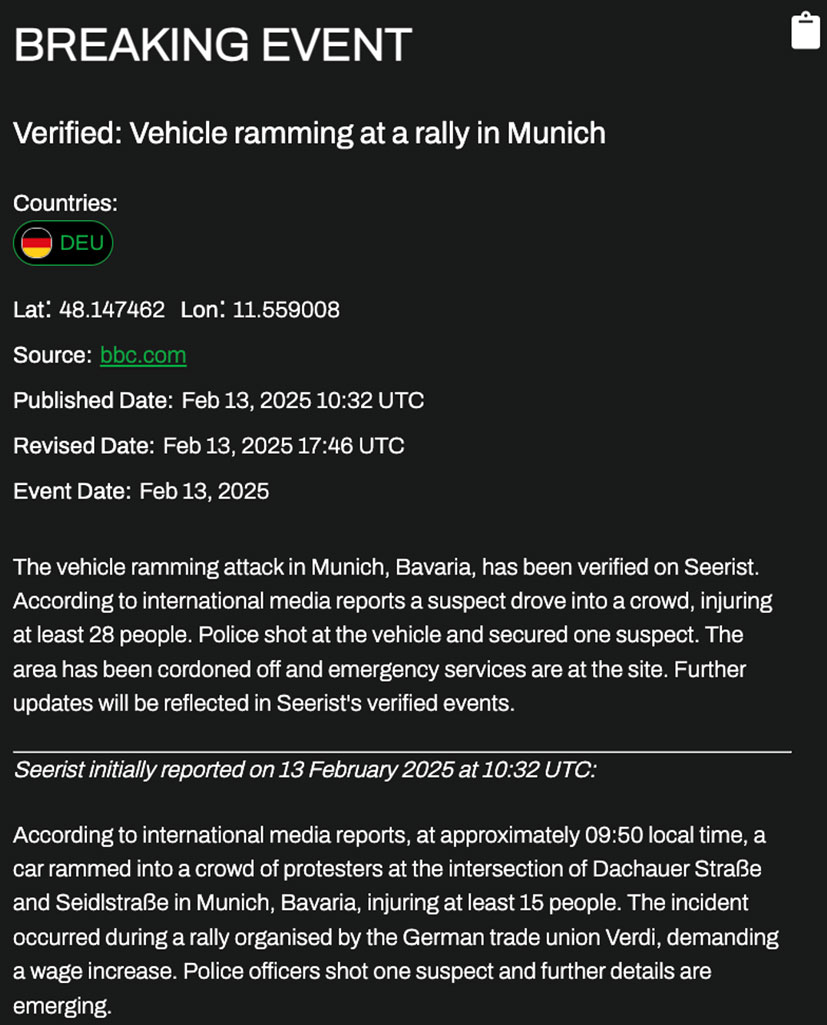
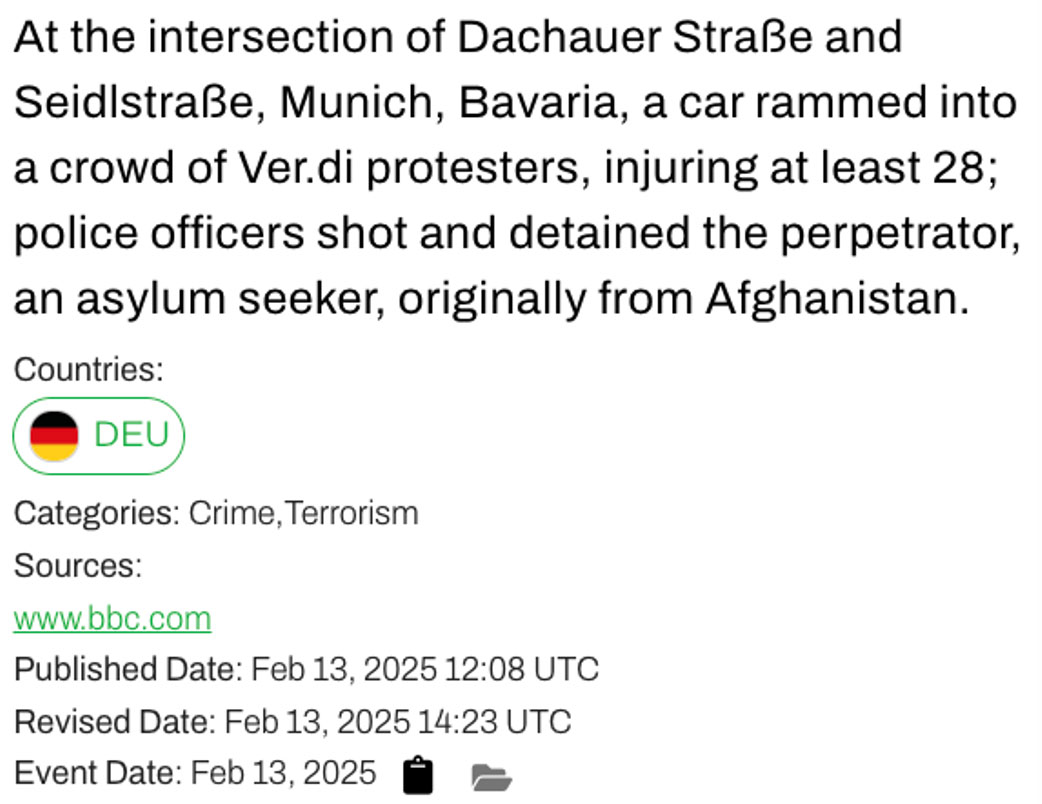



SHARE
THE
REPORT
Control Risks Analysis
Federal elections unlikely to prompt direct security threats against businesses �
Peaceful demonstrations against “a shift to the right” took place on 8-9 February across Germany. The protests, held ahead of elections scheduled for 23 February, attracted tens of thousands of people, and over 250,000 in Munich.
Civil unrest before and after the elections remains unlikely. A strong result for the far-right Alternative for Germany (AfD), approaching or surpassing that of the center-right Christian Democratic Union (CDU), could heighten unrest, though this remains unlikely.
Although political violence has increased ahead of the elections, it mainly targets party offices and events. Businesses and their personnel are unlikely to be targeted unless they have clear political associations.
The overall sabotage threat remains elevated due to geopolitical tensions between Russia and the West, but the elections are more likely to provoke lower-intensity incidents and disinformation campaigns aimed at influencing public opinion.
The elections are likely to increase the threat of violent attacks against polling stations and other well-frequented public spaces; we maintain our MEDIUM terrorism risk rating for Germany.
Protests �The protests were sparked by public outrage after CDU leader Friedrich Merz on 29 January submitted a parliamentary motion on stricter asylum policies that passed with the votes of the AfD. Although the CDU repeatedly stated that it did not actively seek AfD votes, centrist parties and voters saw this as a breach of an agreement to avoid co-operation with extremist parties. The move also sparked incidents of vandalism targeting CDU and AfD offices across Germany, as well as attempts to disrupt a CDU event in Berlin on 3 February. �
Political violence and civil unrest �Civil unrest ahead of and after the 23 February elections remains unlikely. Any protests are likely to remain peaceful, with only occasional clashes between demonstrators and police. However, a strong result for the AfD, exceeding the currently projected 20% support and approaching or surpassing support for the CDU, currently at 30%, would increase the risk of civil unrest, though this outcome remains unlikely. Polling results have remained mostly stable over the last few weeks, and a centrist coalition of the Christian Democrats (CDU and Bavaria-only Christian Social Union, CSU) and center-left Social Democrats (SPD) remains the most likely election outcome.
�Ahead of the elections, political violence has intensified, but it remains primarily directed at party offices, events and officials rather than businesses or their employees. However, companies with a clear and public association with a political party could become targets, drawing attention from activists seeking to make a statement. Throughout 2024, the Greens were most frequently targeted by attacks on members and party offices, according to the Ministry of the Interior. The AfD was most affected by violent crimes, with a total of 93 cases.
Interference from state-backed actors �Although the overall sabotage threat remains elevated due to geopolitical tensions between Russia and the West, the elections are more likely to provoke lower-intensity incidents or disinformation campaigns. These are likely to involve low-level, expendable operatives and may also take the form of acts staged under the guise of activism. A car vandalism campaign under the guise of activism targeted the Greens in December 2024, and authorities suspect Russian involvement in the incident.
�Similarly, perpetrators backed by Russia may seek to incite public outrage against centrist parties to sway the vote in favor of pro-Russian groups, such as the AfD or left-wing populist Sahra Wagenknecht Alliance (BSW). These efforts are unlikely to result in widespread destruction or violence against individuals.
�Terrorism �The elections are likely to increase the threat of violent attacks against polling stations and in other highly frequented public spaces. Such attacks would most likely be carried out by lone actors, for instance radicalized individuals motivated by personal grievances, Islamic or far-right extremism. Attacks are likely to be technology poor (e.g. knife attacks), as German authorities maintain a strong capacity to detect and prevent more complex plots that require high levels of co-ordination. Overall, we maintain our MEDIUM terrorism risk rating for Germany due to a persistent threat from radicalized or disgruntled individuals. Businesses and their personnel face an incidental threat from such attacks.��
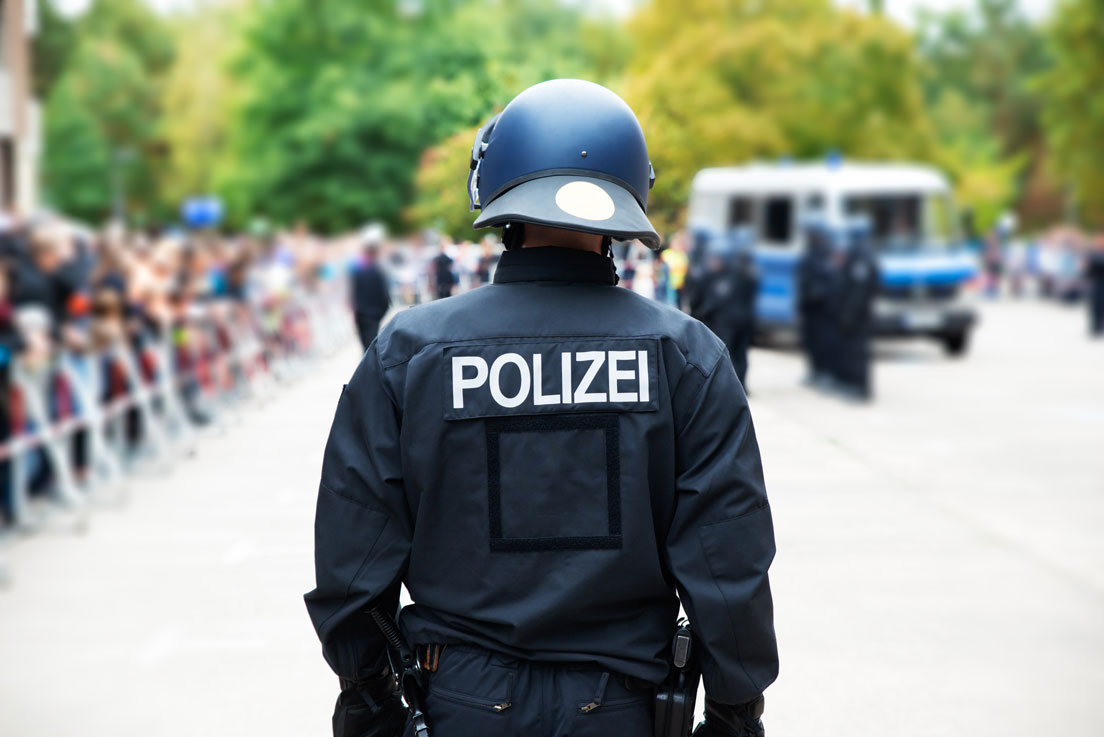
Source: Control Risks analysis published on 11 February 2025
"New protests against the shift to the right”, Tagesschau �"Attacks on party offices and staff are increasing significantly”, Zeit Online ��
Control Risks Analysis
Munich vehicle ramming reflects trend of low-sophistication attacks by lone perpetrators
A car on 13 February drove into people who were reportedly participating in a protest by the United Services Union (Ver.di) transport union in Munich (Bavaria), injuring at least 28 people, two critically.
Although a motive remains under investigation, similar recent attacks have been carried out by disgruntled individuals with mixed or unclear motives, mentally unstable perpetrators and radicalized individuals with links to Islamic extremism.
Overall, vehicle-ramming incidents in Germany remain infrequent but they appear to be an increasing occurrence, and reflect a wider trend of lone perpetrators engaging in low-sophistication attacks such as vehicle-rammings or knife attacks.
Businesses and employees are unlikely to be targeted directly in similar incidents but will continue to face an incidental threat from such attacks.
Our MEDIUM terrorism risk rating reflects a persistent threat of attacks by disgruntled or mentally unstable individuals, and by Islamist or far-right extremist actors.
Incident�The incident occurred at approximately 10.30 (local time) around the area of Stiglmaierplatz, near Dachauer Strasse and Seidlstrasse, in central Munich.�A police spokesperson stated that the driver was arrested at the scene and “poses no danger”. Media outlets have cited eyewitnesses describing the car as deliberately driving at the protesters and police firing shots at the car.�Bavarian prime minister Markus Söder (conservative Christian Social Union, CSU) stated described the incident as "suspected attack” and stated that the perpetrator, an asylum seeker, is originally from Afghanistan. According to Bavaria’s interior minister Joachim Herrmann (CSU), the alleged perpetrator was known to police due to drug-related offenses and shoplifting. Authorities have so far not published any information about a possible motive.�
Investigations ongoing�Although a motive is being investigated, similar attacks in the recent past have been carried out by disgruntled individuals with mixed or unclear motives, mentally unstable perpetrators and radicalized individuals with links to Islamic extremism. German news website Spiegel reported that the suspect allegedly posted Islamist content online before the attack, indicating a potential Islamist background, though authorities so far have not confirmed this. The apparent targeting of a union protest could also indicate a potential political motive, but this is less likely and has so far not been substantiated. There has been no indication of a potential link to the Munich Security Conference (14-16 February) or the 23 February federal elections so far.
�Overall, vehicle-ramming incidents in Germany remain infrequent but they appear to an increasing occurrence. They reflect a wider trend characterized by lone perpetrators engaging in low-sophistication violent attacks in Germany. On 20 December 2024, five people were killed and more than 200 were injured in a vehicle-ramming incident at a Christmas market in Magdeburg (Saxony-Anhalt). Authorities suspect the perpetrator has been motivated by personal grievances. In 2016, an Islamist extremist drove a truck into a Christmas market at Breitscheidplatz in the capital Berlin, killing 13 people and injuring more than 70.
MEDIUM terrorism risk rating�Similar but less impactful vehicle ramming incidents have taken place across Germany in recent years, but most of the attackers in these cases have been identified as disgruntled or mentally unstable individuals rather than by extremist individuals or groups. Businesses and employees are unlikely to be targeted directly, but face an incidental threat from such attacks.
�Our MEDIUM terrorism risk rating reflects a persistent threat of attacks by disgruntled or mentally unstable individuals, and Islamist or far-right extremist actors.�
Source: Control Risks analysis published on 13 February 2025
“Munich: Suspected attack – the driver is a 24-year-old Afghan”, Bayerischer Rundfunk�“Car drives into Ver.di demonstration march in Munich – Söder calls it an attack”, Spiegel�“Car drives into crowd – at least 20 injured”, Tagesschau��


Request a demo
Request a demo to see how Seerist can support your security �and intelligence efforts.
Explore Seerist Today
The foresight to get ahead of what may come.

The insights with the most impact.

Accelerate speed to decision.

Monitor Misinformation with Customized Events Al Search
Misinformation Susceptibility filter allows users to assess and monitor potential misinformation related to the Germany Federal Election.
This rating indicates whether a source is susceptible to including misinformation in its published content. The inclusion of misinformation may be due to the source being biased, part of a misinformation dissemination network, or due to a failure by the source to detect that the information is false.��
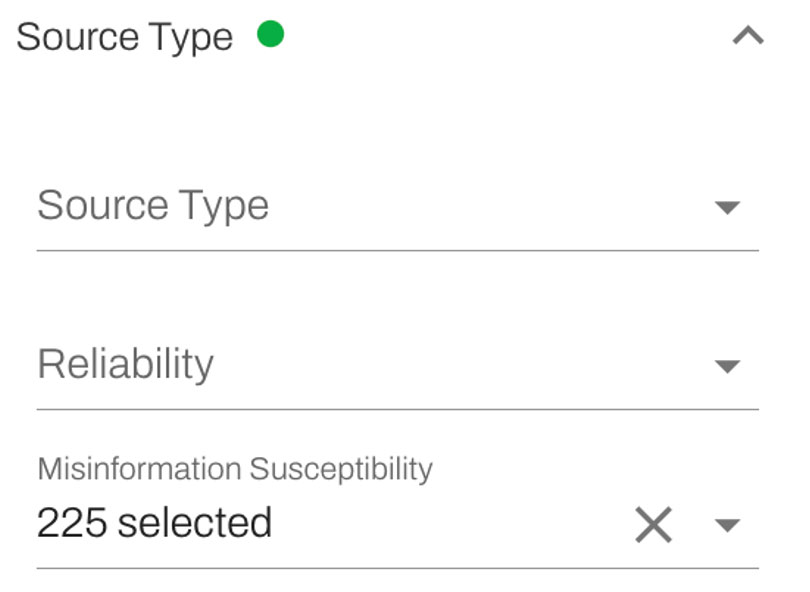
This is tagged at a nation-state level, showing where the source is susceptible to including misinformation from particular countries. When a source includes misinformation from non-state actors, we include an ‘Issue Specific’ tag.�
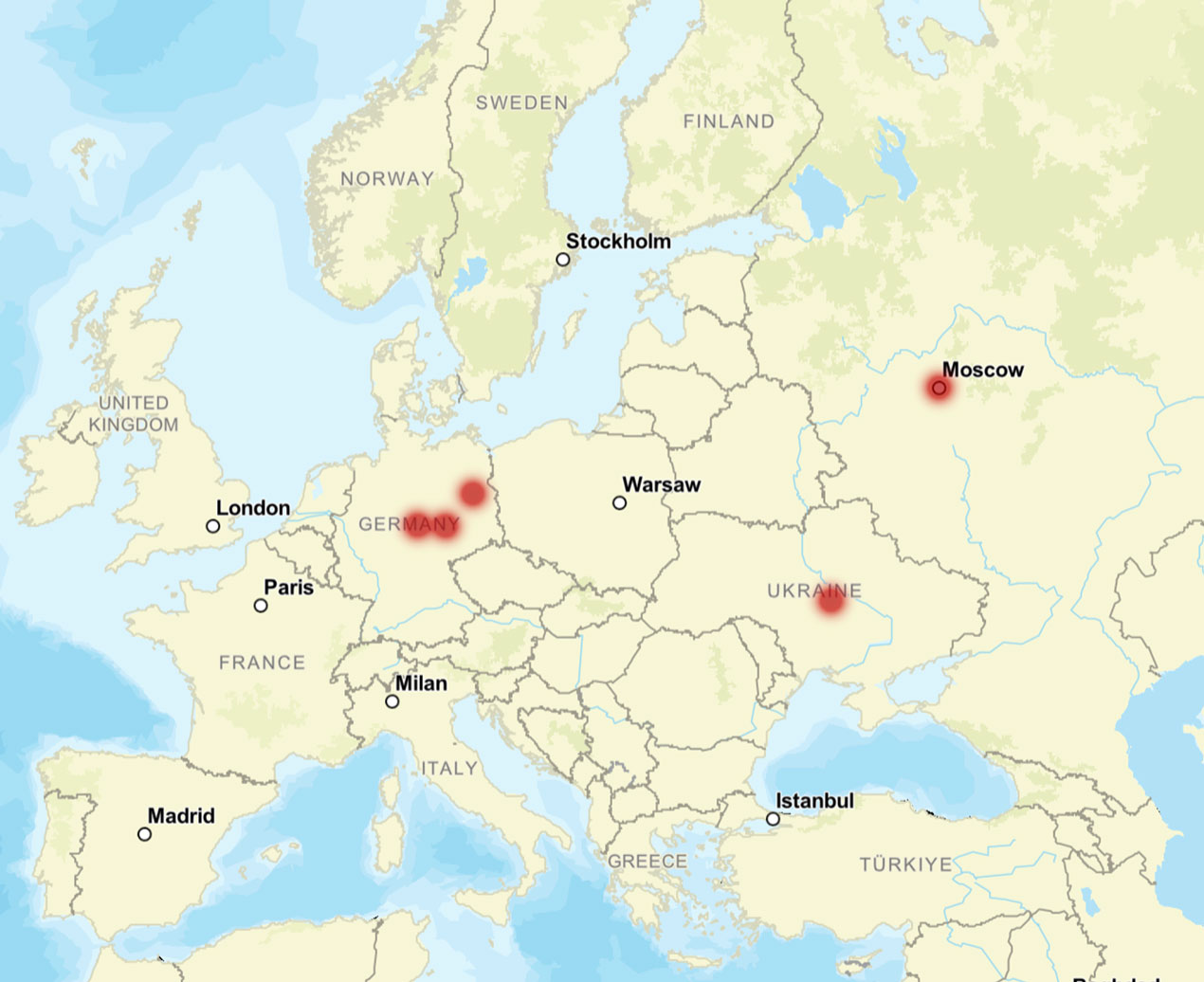
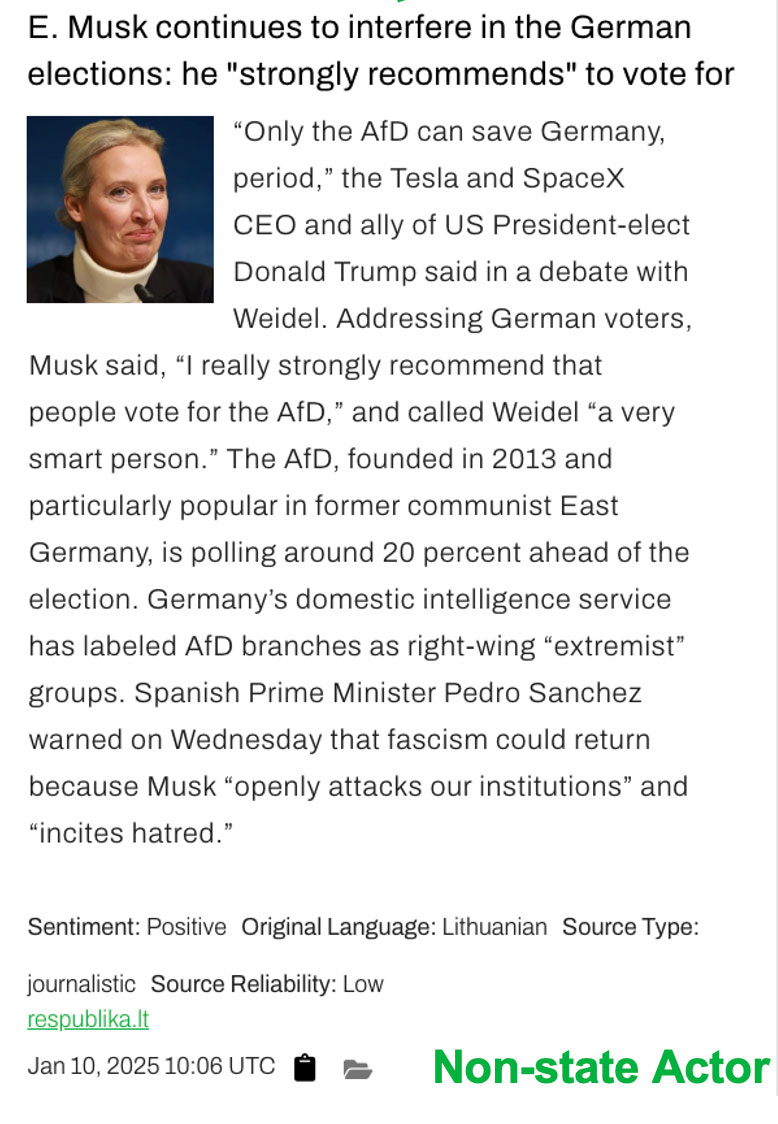
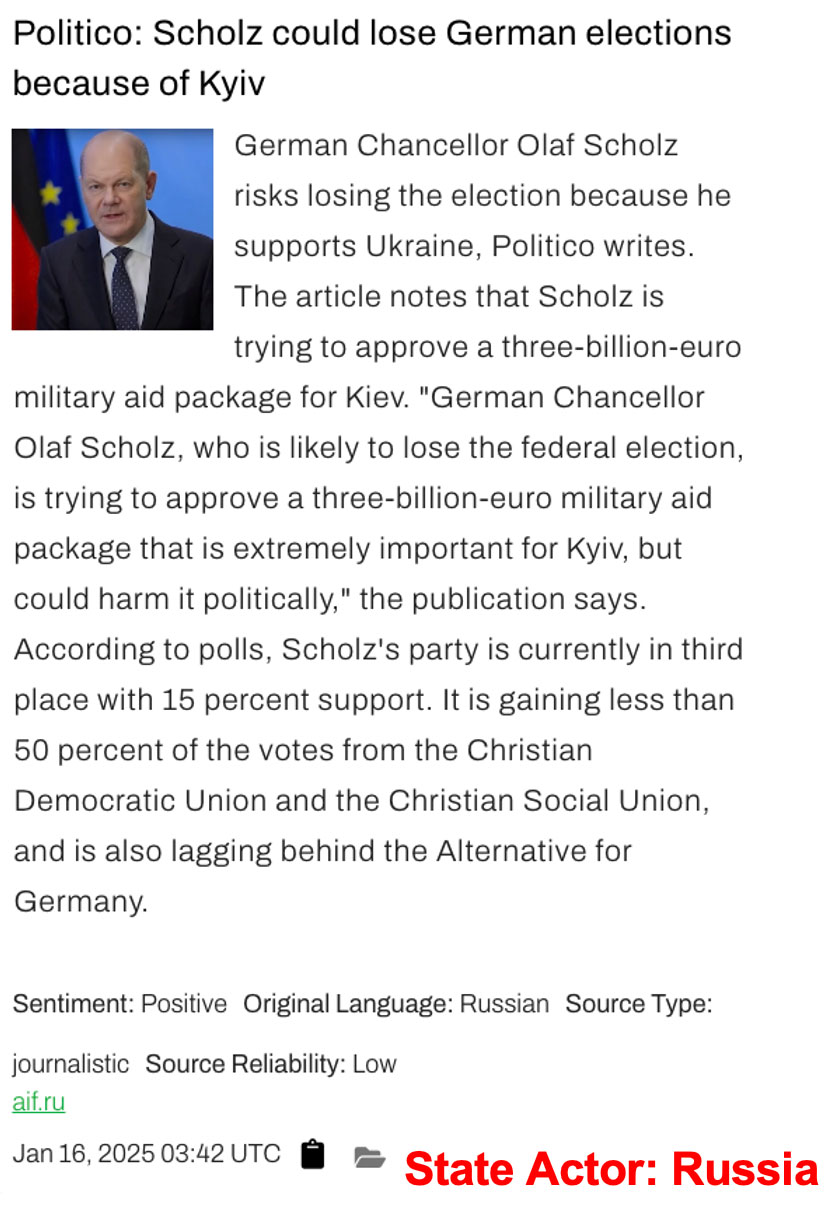
Non-state Actor
State Actor: Russia
The heatmap of the Germany Federal Election-related EventsAI search results, with Misinformation Susceptibility filter ON, between 1 January and 12 February, indicates that Russia is the primary state actor for sources of misinformation. �



Request a demo
Request a demo to see how Seerist can support your security and intelligence efforts.
Explore Seerist Today

